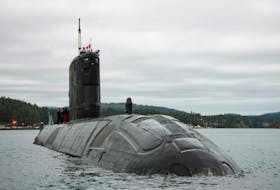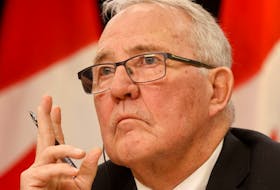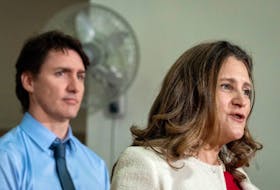The best scene in the fourth episode of the latest instalment of “The Crown” — other than when the Queen tears yet another strip off her hopeless oldest child — is the one in which some hapless advisor tells Prime Minister Margaret Thatcher that the preferred response to Argentina’s invasion of the Falklands would be to let diplomats handle it.
“Do nothing?” a disgusted Thatcher rages. “How will it possibly end up well if we do nothing?” (Spoiler alert: if you didn’t already know Margaret Thatcher liberated the Falklands, you shouldn’t get your history from TV dramas).
Doing something as opposed to nothing may be well and good for proud nations that once ruled a worldwide empire, but it’s not the sort of thing Canadian governments go in for. Playing for time and hoping for the best is something we’re good at. It’s a Canadian specialty, like making sincere pronouncements and robotic space arms.
Former prime minister William Lyon Mackenzie King was a master at it. King held office for 22 years. His greatest achievements include … staying in office for 22 years. It operates on the theory that if you ignore a problem long enough, it will sort itself out, or die of old age.
And sometimes it works. This week, Telus confirmed that equipment from China’s Huawei Technologies Co. will play no part in its 5G mobile network. Telus had earlier indicated it would rely on other suppliers, but hadn’t entirely precluded the possibility of using Huawei equipment in some instances. The Globe and Mail reported that the exclusion will be full , because Telus thinks Prime Minister Justin Trudeau’s government will eventually ban the firm anyway.
It’s a good guess, though it may ascribe a greater degree of backbone than federal Liberals possess. Bell Canada and Rogers Communications reached the same conclusion earlier this year. Yet, by removing the need for Ottawa to actually take a firm stand, the three companies have relieved much of the pressure on Trudeau to do so.
Ottawa has already turned its agonizing over Huawei into something of a career, long after Canada’s allies made their positions clear. Australia banned Huawei two years ago. Malcolm Turnbull , who was prime minister at the time, has since taken to warning fellow leaders to be wary of Beijing and its claim that it would never use Huawei to steal technology, spy on other countries or suck up private data.
“In China, if the Communist party government tells you to do it, you have to. It’s actually part of their intelligence law,” Turnbull told CBC . “Given the tensions that exist, given the history, why would you give capabilities that could be used against you to somebody whose intent, which may be benign at the moment, could easily change?”
Canada is the only one of the Five Eyes intelligence-sharing network that still hasn’t formally rejected Huawei. New Zealand, the United States and Britain have all done so. In deciding to use other suppliers anyway, Canada’s communications giants have ensured that the Liberals can go on “studying” the situation at their leisure. Maybe some day down the road, when the 5G networks are all up and running, some brave future Liberal supremo will call a press conference and admit, “Gee, OK, we really didn’t want Huawei doing business here, but we were too timid to say so.”
Not that Liberals want to be seen as pushovers who are too nervous of incurring China’s displeasure to stand up for Canada’s interests. To that end, they’ve let it be known they are diligently working on assembling like-minded democracies into a united front for possible future deployment against Chinese aggression.
“If the alliance was strong, the next time China embarked on hostage diplomacy, they would understand they have to change the way they do business,” asserted Guy Saint-Jacques, a former ambassador to Beijing. Maybe “next time” will come before China cracks down further on some of the 300,000 Canadian passport-holders in Hong Kong under its draconian new security laws. Maybe not.
There is safety in numbers, and the Trudeau team obviously feels it would be safer joining a large team of countries rather than risk facing up to Beijing on its own. The idea fits with Trudeau’s preference for international agencies like the United Nations, where sharp words can be exchanged in safe diplomatic settings before everyone breaks for lunch and no actual action is required.
Indeed Foreign Affairs Minister François-Philippe Champagne took a shot at opposition parties, which have demanded a clear plan on Chinese aggression, including a decision on Huawei within 30 days. “”I know … that some like to talk tough on China,” he told a House of Commons committee. “To those who are seduced by this one-dimensional view, I say this: while it is easy to be tough, let’s continue to be smart.”
Some would say it’s possible to be both tough and smart. Margaret Thatcher would certainly never have accepted the idea that waiting and hoping, fingers crossed, represents “being smart,” or that asserting national interests is “one-dimensional.” Nor, apparently, do Australia, New Zealand, the U.S., Japan or other countries that are taking material measures against Chinese interference. But they don’t have Canada’s faith in the miraculous powers of procrastination.
National Post
Twitter.com/kellymcparland
Copyright Postmedia Network Inc., 2020








